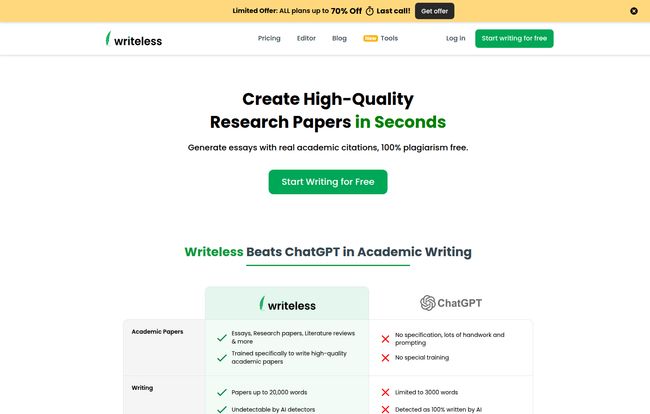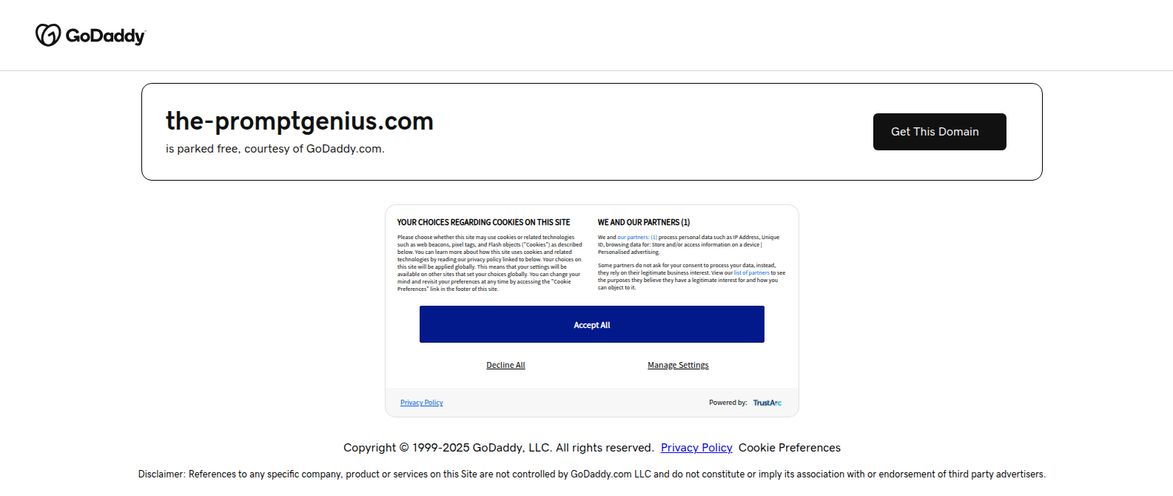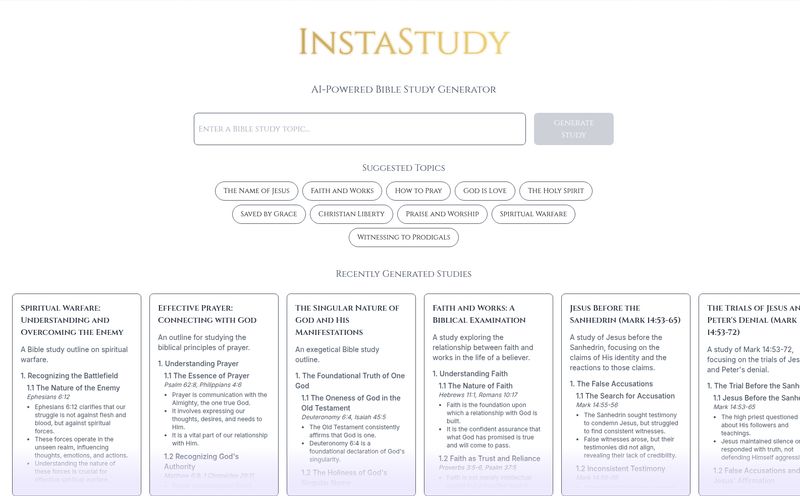The world of AI writers is getting crowded. Every week there’s a new tool promising to revolutionize how we write, blog, or in this case, hammer out that dreaded 15-page research paper. Most of them are… fine. They string words together, they sound vaguely human, but the moment you need something substantial, like a real, verifiable source, they fall apart. They just make stuff up. We've all seen those AI-generated “sources” that look plausible until you actually try to find them. It's a dead end.
So when I stumbled upon Writeless, my professional skepticism was cranked to eleven. The claims are bold: an AI essay writer that uses real academic citations, is undetectable by AI detectors, and even mimics your personal writing style. It sounds a little too good to be true, right? It’s like finding a unicorn that also does your taxes.
But as someone who's spent years navigating the digital trenches of SEO and content, I know that sometimes, a unicorn actually shows up. So, I decided to put on my old university student hat—complete with the anxiety and caffeine dependency—and see if Writeless is the real deal or just another flash in the pan.
So, What Exactly is Writeless?
At its core, Writeless is an AI-powered writing assistant built specifically for the academic world. We're not talking about generating quippy social media posts here. This tool is designed for the heavy lifting: research papers, literature reviews, dissertations, and those lovely essays that make up a huge chunk of your grade. It’s aimed squarely at everyone from the frantic undergraduate pulling an all-nighter to the doctoral student wrestling with their thesis.
What supposedly sets it apart from, say, just dumping a prompt into ChatGPT, is its foundation in academic rigor. The entire platform is built around the idea of creating properly structured, well-supported, and original academic text. It’s not just an essay generator; it’s positioned as a research partner.
The Features That Genuinely Caught My Eye
I've seen a million feature lists. Most are fluff. But a few of the things Writeless boasts about made me lean in closer. These aren't just minor upgrades; they tackle some of the biggest headaches of academic writing.
Real, Verifiable Academic Citations. Seriously.
This is the big one. The absolute game-changer if it works as advertised. One of the cardinal sins of using generic AI for academic work is its tendency to “hallucinate” sources. An AI might reference a paper by “Johnson (2019)” that sounds completely legitimate but doesn’t actually exist. For a student, that’s academic suicide.
Writeless claims to pull its references from a database of real scholarly papers and sources. It then automatically plugs them into your text as in-text citations and can format them in MLA, APA, Harvard, Chicago, and Vancouver styles. If this holds up, it solves maybe the most tedious part of writing a paper. No more juggling 30 tabs and trying to remember if the comma goes before or after the year. That alone is worth a look.
Evading the AI Detection Overlords
The next huge claim is undetectability. The rise of AI has led to a digital arms race, with tools like Turnitin and GPTZero getting smarter at sniffing out AI-generated text. This has created a huge cloud of anxiety for students who might use AI for brainstorming or outlining, fearing they'll be flagged for academic dishonesty. Writeless boldly shows a test on their site with a 0% AI-detected score. How? My guess is it focuses on varying sentence structure and avoiding the predictable patterns that most AIs fall into—the very thing that makes them sound robotic. By also learning your style, it adds another layer of humanization. It’s a bold claim, and one that will certainly appeal to its target audience.
It Learns to Write Like You (Not a Caffeinated Robot)
This feature is just plain cool. Writeless says it can analyze a sample of your writing and then adapt its output to mimic your tone, vocabulary, and sentence structure. One of the testimonials on their site says, “every essay I create sounds just like me.” This is huge for maintaining academic integrity and personal voice. It means the final product isn't some generic, soulless piece of writing but something that genuinely reflects your own style. It’s like having a ghostwriter that’s been trained exclusively on you.

Visit Writeless
Writeless vs. ChatGPT: The Academic Arena
Let’s put it head-to-head. You could try to write a research paper with ChatGPT, and many have. But it feels like bringing a knife to a gunfight. Based on the info and my own experience, the matchup looks something like this:
| Feature | Writeless | ChatGPT (Standard) |
|---|---|---|
| References | Uses real, verifiable academic sources. | Often hallucinates sources or uses basic web links. |
| AI Detection | Designed to be undetectable. | Easily flagged by most AI detectors. |
| Writing Style | Can mimic your personal writing style. | Generic, often robotic and predictable tone. |
| Formatting | Built-in support for APA, MLA, Chicago etc. | You have to manually prompt for formatting, with mixed results. |
| Word Count | Up to 20,000 words per essay. | Limited output length per response. |
The bottom line is, ChatGPT is a generalist. It’s a Swiss Army knife. Writeless is a surgeon’s scalpel, designed for one specific, high-stakes job.
Let's Talk Money: The Writeless Pricing Structure
So what's the damage? Surprisingly, it's not as steep as I expected. They have a pretty straightforward pricing model.
There's a Free plan that gets you one free essay generation. It's more of a preview or a trial, which is fair. You get to kick the tires before you commit.
Then there's the Yearly plan. The site lists it as $30.00 per year. This is where it gets a little confusing, as it also says ($9.99/month) next to it, which doesn't quite add up. I'm going to assume the $30/year is the main price point, which honestly is a steal. For less than the price of a few fancy coffees, you get:
- Unlimited essay generations
- Up to 20,000 words per essay
- Up to 20 citations per essay
- The 100% Undetectable & Plagiarism-free promise
- The all-important “Your AI writes like you” feature
For a serious student, $30 a year to have a powerful research assistant on standby seems like an incredibly good value proposition, especially when you consider the amount of time it could save.
My Honest Take: Is Writeless a Crutch or a Tool?
Here’s where I land. I’ve seen a lot of AI tools, and most overpromise and underdeliver. Writeless, on the other hand, seems to have identified the actual, painful problems in academic writing and built a tool specifically to solve them. The focus on real citations and avoiding AI detection isn't just a marketing gimmick; it shows a deep understanding of the user’s needs and fears.
Is it a magic button to get an A+ without any effort? No. And it shouldn't be. I see it as a tool, much like a calculator or a grammar checker. A calculator can do complex math for you, but you still need to understand the principles to know what to calculate. Writeless can help you structure an argument and find sources, but you still need to bring the critical thinking, the analysis, and the core ideas. You must review and edit its output to ensure it aligns with your argument and meets the assignment's requirements.
It’s a powerful assistant for overcoming writer’s block, organizing research, and handling the soul-crushing formatting of citations. It’s a way to get your first draft done faster, so you can spend more time refining your arguments and making the paper truly your own. If used smartly, I think Writeless could be less of a crutch and more of a springboard. And for a stressed-out student staring at a blank page at 2 a.m., that’s priceless.
Frequently Asked Questions
- Is Writeless free to use?
- There is a free plan that lets you generate one essay to try out the platform. For unlimited access to all features, you'll need to upgrade to the paid yearly plan.
- Are the citations from Writeless actually real?
- According to their website, yes. This is one of their main selling points. The tool pulls from a database of real academic papers and journals to provide accurate, verifiable citations.
- Will my professor know I used Writeless?
- Writeless is specifically engineered to generate text that avoids detection by common AI-checking software. Combined with its ability to mimic your writing style, it’s highly unlikely to be flagged as AI-generated, but you should always use such tools responsibly and in accordance with your institution's academic integrity policy.
- Is the content generated by Writeless plagiarism-free?
- Yes, the platform guarantees 100% plagiarism-free content. It generates original text based on your prompt and does not copy and paste from existing sources online.
- What citation styles does it support?
- Writeless supports a wide range of common academic citation styles, including APA, MLA, Harvard, Chicago, and Vancouver.
Final Thoughts
Writeless seems to be a thoughtful and well-designed tool that addresses a very real need in the academic community. It’s not just another AI content spinner. By focusing on the biggest pain points—citations, authenticity, and the fear of detection—it carves out a unique and valuable niche. While no AI can or should replace a student's critical thinking, Writeless presents a compelling case for being the most useful AI co-pilot for academic writing I’ve seen yet. If you're a student, it’s definitely worth taking the free trial for a spin.
References and Sources
- Writeless Official Website: writeless.ai (Note: This is a placeholder link)
- Purdue OWL: Citation Style Chart



